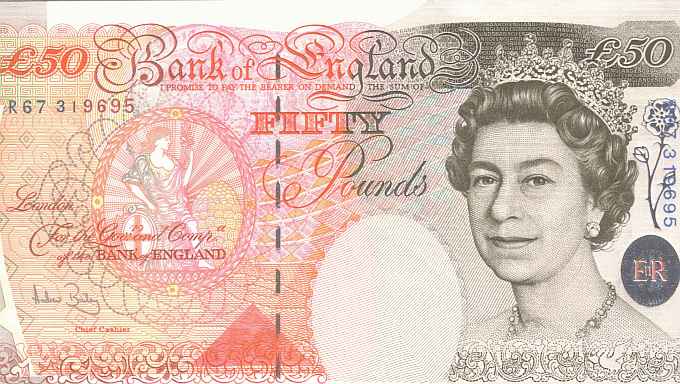
これはイングランドの50ポンド札の写しである.上方から左中程にかけて,"I PROMISE TO PAY THE BEARER ON DEMAND THE SUM OF FIFTY POUNDS For the Gov:r and Comp:a of the BANK of ENGLAND" という文が読める."Gov:r" は governor,"Comp:a" は company の略だが,このような略記は一般にはお目にかからない.特に company は co と省略されるのが普通であり,compa は珍しいだろう.実際に,OED (compa | Compa, n.) を参照すると,現在では紙幣における表記としての使用がほぼ唯一の使用例であるという.
1940 G. Crowther Outl. Money i. 25 Every Bank of England note..bears the legend, 'I Promise to pay the Bearer on Demand the sum of One Pound' ..signed, 'For the Govr'. and Compa. of the Bank of England' by the Chief Cashier.
これを Company (< ME compaignie < AF compainie = OF compa(i)gnie) の略記であると解釈することに異論はないが,歴史的にはイングランドに銀行業をもたらしたイタリアとの関連で,イタリア語の同根語 compagnia の影響を認めてもよいかもしれない.Praz (35) は,次のように述べている.
Banking, as is well known, was first introduced into England by Italians; first by Sienese, then, after the middle of the thirteenth century, by Florentine merchants; Venice appeared on the scene at the beginning of the fourteenth century. Italian merchants were protected by Wolsey and Thomas Cromwell; they began to lose ground only during the age of Elizabeth. . . . The abbreviation Comp:a on the Bank of England notes is nothing else but a faint echo of the vanished glory of many an Italian Compagnia or firm.
「#1411. 初期近代英語に入った "oversea language"」 ([2013-03-08-1]) の最後に触れた通り,ロマンス諸語からの借用の多くは,フランス語を経由するなどしてフランス語化した形態で英語に入ってくることが多かった.語の借用過程は主として形態を参照しながら探るのが歴史言語学の定石だが,語源学や語誌研究においては形態以外の項目にも注意を払うと,新たな洞察が得られて実り豊かである.
・ Praz, Mario. "The Italian Element in English." Essays and Studies 15 (1929): 20--66.